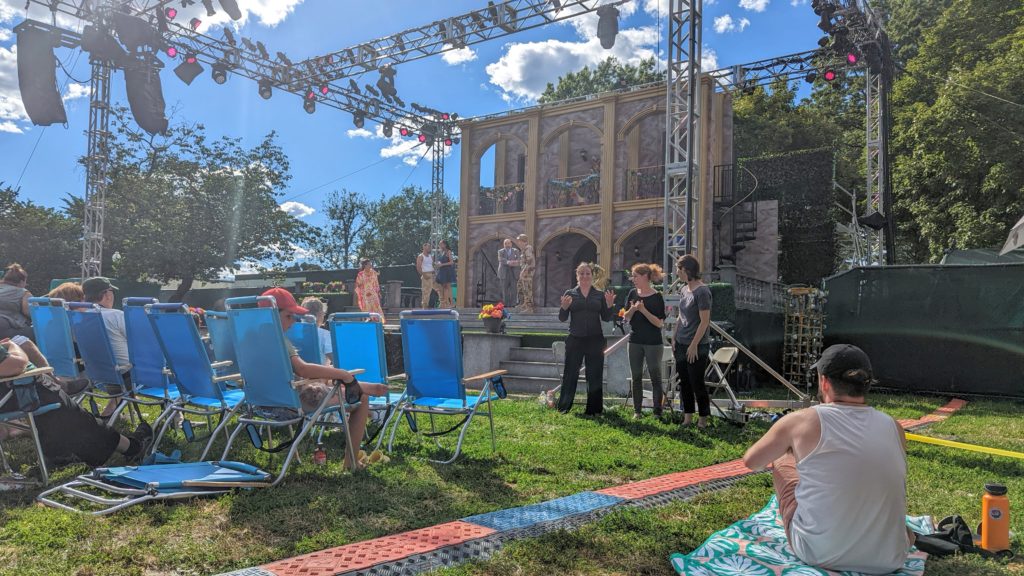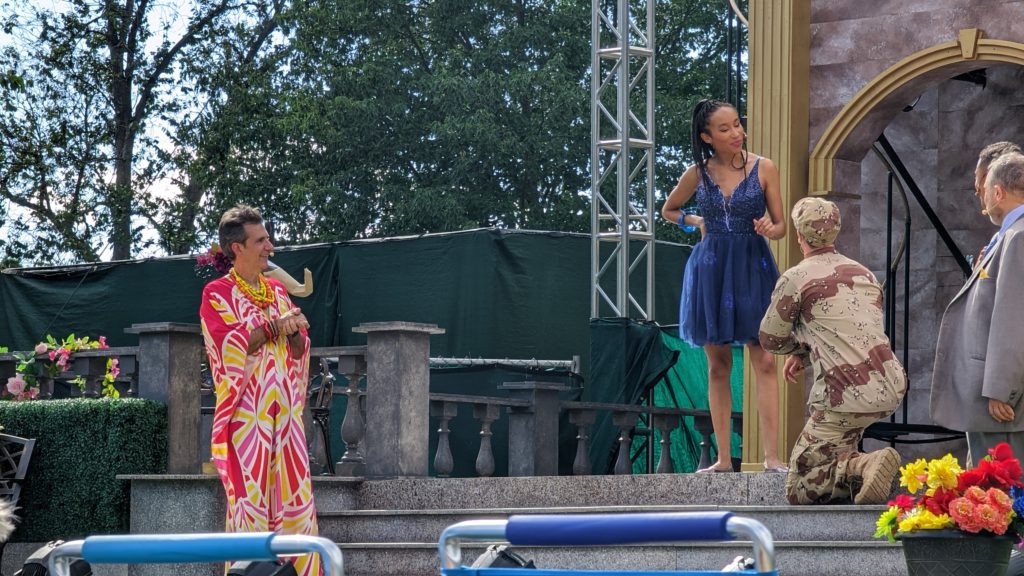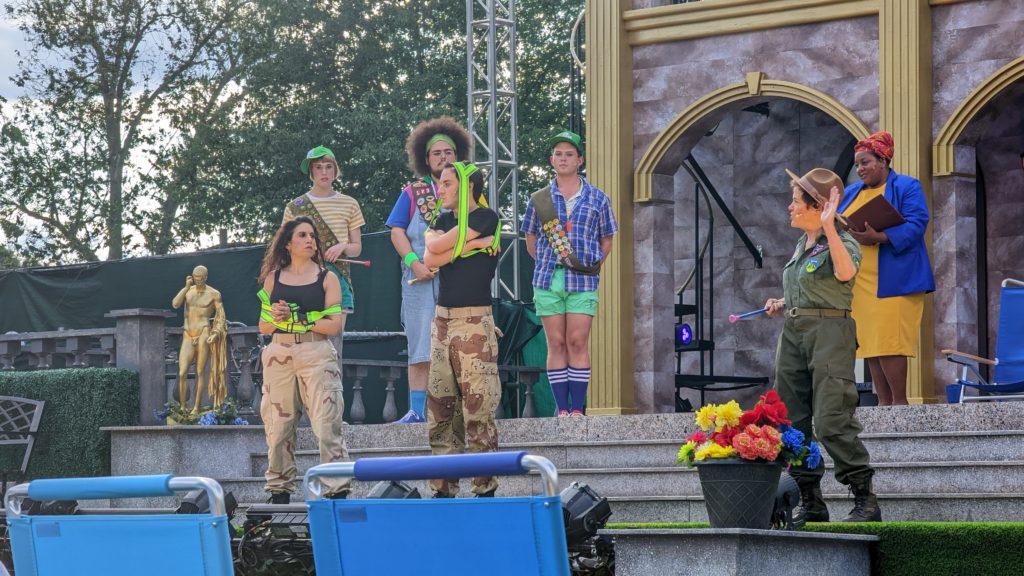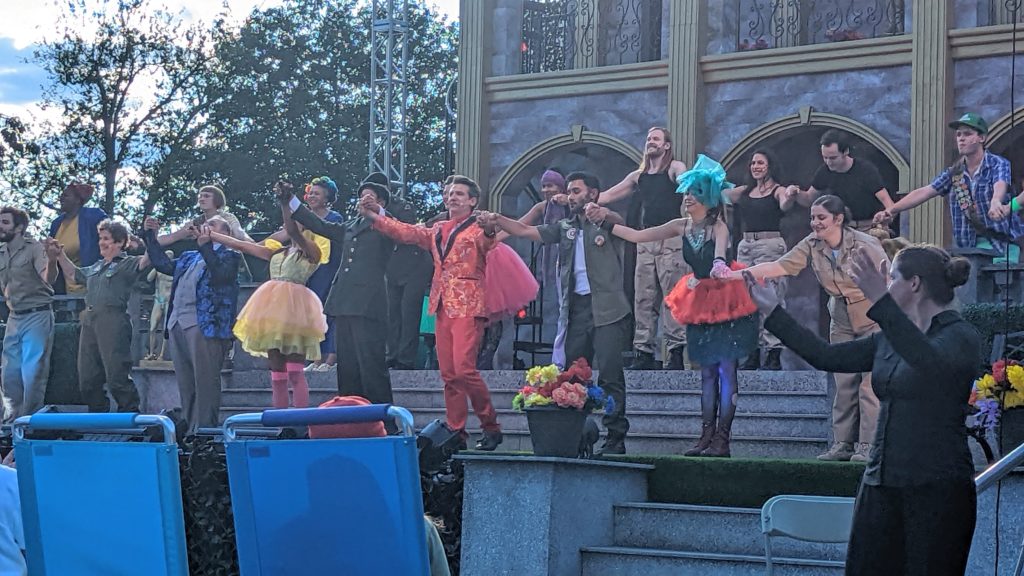Oh Shakespeare, how I’ve missed you. I know that there are plenty of opportunities to go hunt down Shakespeare in his various forms, from high school productions of Midsummer Night’s Dream to more esoteric offerings like the occasional Cymbeline. But life being what it is, I find that if I can get to at least one show a year I’m rejuvenated. And that show is often Commonwealth Shakespeare’s free production on Boston Common. This marks their 26th year doing it, and I’ve seen 15 of them. 17 if you count my first discovery of the production, where seeing the show was more like happening randomly upon it and saying, “Oh hey let’s say and listen for a little bit.”
This year’s show was Much Ado About Nothing, which they last performed in 2004, which I did see :). That predates this blog, so alas I don’t have a review so we can compare and contrast.
I loved this show. Love love loved it. This year we went to a surprise 4pm show on a Saturday – normally we go to the 8pm. So we baked in the sun a little bit, but surely no worse than the actors in their full military uniforms. It was also a special opportunity to see an accessible show, with both open captioning as well as ASL interpreters. I know a little sign language, but not nearly enough to appreciate what must be the enormous effort of trying to interpret a Shakespeare play. Not to mention there were only three of them, so each was no doubt handling multiple parts.
The play itself, as I’m sure you know, is one of Shakespeare’s most modern, approachable comedies. Claudio and Benedick are friends, Hero and Beatrice are friends. Claudio and Hero want to get married. Beatrice and Benedick pretend to hate each other but are really doing that “oooo i hate him … when’s he getting here? he is coming, right? you know, cuz, oo, I hate him so much!” thing. There’s no letter writing to confuse the audience, no long lost twins or people disguising themselves. Just good old fashioned romantic comedy. Even the villain, Don John, has little more evil to perform than to say, “A wedding, you say? I must wreck it!” *maniacal laugh*
This one’s done up in an 80’s theme, so the music and the costumes are pretty much exactly what you’d imagine (including an amusing surprise at the end that I won’t spoil). I love productions that treat the story like a big party among friends, and that’s exactly what we get. The soldiers have come back from the war, and Leonato has opened his home to them for a month. That’s our setting. It should be a party. It’s like summer vacation, you know it’ll be over eventually so you relax and enjoy it while you can.
Let’s get right into the casting and characters, since I don’t think I need to keep talking about the plot. I quite loved everybody. As I tried to explain to my kids, with the comedy you have to play a wide range. You have to go over the top and sell the outrageous bits, but for the serious bits you need to do some real acting so the the audience follows what’s happening and isn’t just there to laugh. I’ve said in the past about this particular company’s productions that I think they tend to dumb it down for the audience in a way that I don’t like. Lots of fourth wall breaking and stuff that feels like improv. None of that this year. They stuck to the script, and they sold it, and I’m happy.
Erik Robles as Claudio might as well have been the star, truly. Often you can picture Claudio as the goofy, lovesick sidekick of Benedick who is so easily duped by Don John that you roll your eyes at how clueless he is. Not here. Looking a bit like Jesse Williams (from where we sat), Robles immediately sold being head over heels in love, sometimes dropping into Spanish as he poured out his love for Hero. When he confronts Hero at the wedding you bought his heartache, and when he realized his mistake you bought his misery. Every other time I’ve seen this play I’d tell you it’s the Beatrice and Benedick story, but this time I honestly found myself paying more attention to the Claudio/Hero story.
Rebecca-Anne Whittaker’s Hero was the perfect match for Claudio, the chemistry was obvious. They didn’t look like “local rich guy’s daughter is promised to soldier”, they looked like a couple who met at a party and fell in love at first sight. When falsely confronted with accusations of infidelity she stands up for herself as best she’s able, she doesn’t do the whole “Oh dear, I’m so helplessly lost, I don’t know what’s happening!” *swoon* kind of thing from the old days. She confronts the men accusing her, demands to see their evidence. Of course this doesn’t get her anywhere, her own father still says, “Do not live, Hero; do not ope thine eyes” – one of my favorite lines in this play because it’s just so over the top. She doesn’t deserve that. At least during the big reveal she seems to get some balance back in the relationship. Her pulling back the veil isn’t so much, “Surprise, my beloved, I’m not dead!” as it is “Told you, jackass.” I could imagine the wedding night being tough for our boy Claudio.
Rachael Warren’s Beatrice owns the stage whenever she’s on it. She’s a big, bold presence who’s not afraid to let you know her opinion on everything – exactly as Beatrice should be. She’s absolutely the kind of friend that says, “You shamed my friend on her wedding day? I’m going to have my boyfriend kill you.” Even a brief scene, like when Don Pedro asks to marry her and her first word is a too quick, “No!” and she has to backpedal her way out of it, shows impeccable comic timing.
Now, with Tia James as Benedick, we come to my only real issue with the show. I have nothing against her acting. In fact I quite liked it. You’ll note I’m saying her. That’s fine; I’ve got no issues at all with gender blind casting. I told the kids when I spotted the program, “Oh, looks like Benedick’s cast female in this production. That will be interesting.” She does a great job as Claudio’s buddy, who keeps finding herself surrounded by well-meaning friends asking her, “So, why aren’t you married yet?” and turning into that romantic, poetry-writing cliché she swore she’d never become.
But here’s my confusion – they changed *some* of the language. Benedick is referred to as “she” throughout the production, and I think I heard the occasional “madam” where a “sir” would have been in the original text. Again, ok, but … most of Beatrice’s lines are about not wanting a husband. She has those great lines about how she’ll never marry a man with a beard, but how a man with no beard is no man. Benedick, for her part, talks about beards and bachelors and not “hanging her bugle in an invisible baldrick” and more often than not I was left wondering, “What’s happening here?”
Shakespeare is confusing enough as it is for your typical audience. Like I said, I’ve been to 15 of these alone, and I can’t tell you how often my friends and family lean over to me and say, “Who is that? Who is she talking about?” When there is no action to accompany the words, it’s easy to lose track of what’s happening. So when you get into a situation where you can no longer rely on pronouns or words like “husband”, you’re making it that much harder for the audience to understand what’s happening. Especially when it comes to gender. You could have a man playing a woman, or a woman playing a man. Or a woman playing a woman who dresses up like a man. There’s a point where you need to forget what your eyes tell you and pay attention to the words.
That’s my only difficulty with this production. Not even so much that I disagree with it, just that I truly don’t understand what I was supposed to be watching. Beatrice spends most of the play talking about how no man is good enough, and she’ll never find a husband .. and then ends up with a character that’s been called “she” the whole time (a character who, by the way, has spent equal time referring to herself as a “bachelor”). Ok, so, did we just make Beatrice bi? Is that what’s happening here? We don’t get to sit down and talk to these characters and have our questions answered. All we get is what Shakespeare and the director give us. I have no issue with any of these decisions, I truly don’t. Make them a gay couple. Or make a play that is entirely gender neutral so it doesn’t matter. Whatever you want to do. It’s your show. But you left me not understanding what you were trying to do, which bothers me most because I’m left with too many questions. I don’t want to do your show any injustice by misinterpreting what you were trying to accomplish.
Before I go, I have to give one last shout-out to Debra Wise as Dogberry. You can’t review a Much Ado without talking about Dogberry! Dressed like a park ranger and surrounded by boy scouts, my best description at the time was that Wise was channeling (Emmy Award-winning) Laurie Metcalfe, and I say that as a real compliment. She’s bellowing, she’s over the top, she’s an ass. Just like we like our Dogberry.
So there you go! I meant what I said, I love love loved this. I am in no way going around saying, “Wait until you hear how they screwed with the gender and the pronouns!” because I’m at least a little afraid that, just by bringing it up, people are going to take issue with my review. I repeat – I’m open to however you want to present Shakespeare in your vision. But I want it consistent, and I want it to answer any obvious questions I’m likely to have. I’m honestly wondering if the director may have just left in a lot of the questionable words because it was too hard to change them all and because she figured the audience wouldn’t even notice (see earlier comment about dumbing down the productions). That could be miles from the truth. I don’t know. See what I keep saying? Hell, I’d love to sit down with the director and ask her all these questions. Maybe one of these days I’ll get the chance.
If you’re able, go see it. It’s a great night out. It’s short (looking back at the script I can see several scenes they cut), there’s music and dancing, and everybody goes home happy. What more can you ask?
Pictures!





thanks for the shout-out for this production! Just wanted to share a thought re Benedick and Beatrice…. one way to look at this relationship is that Beatrice is coming out to herself….